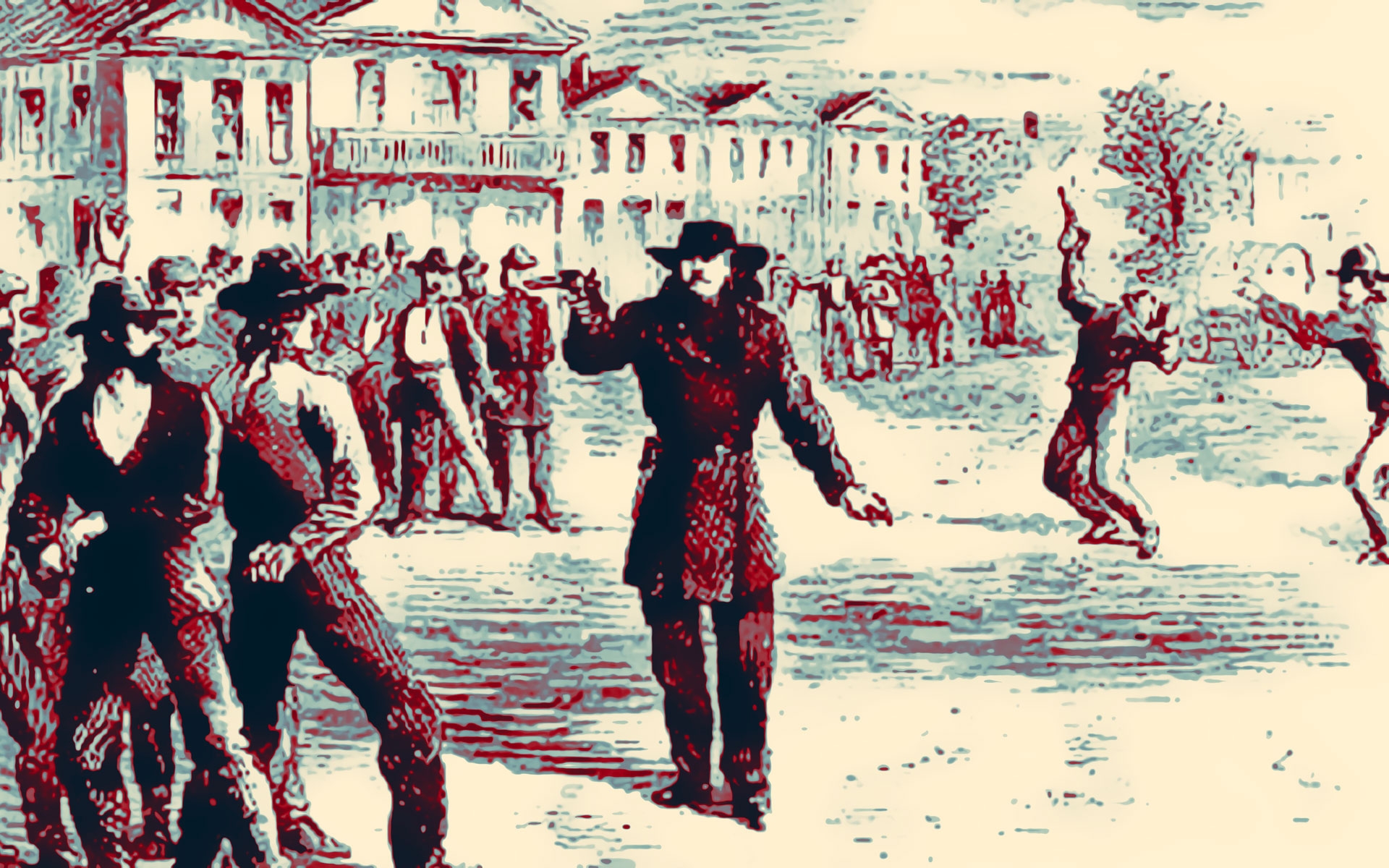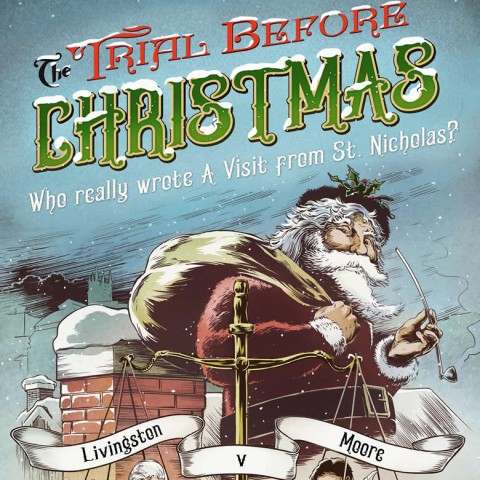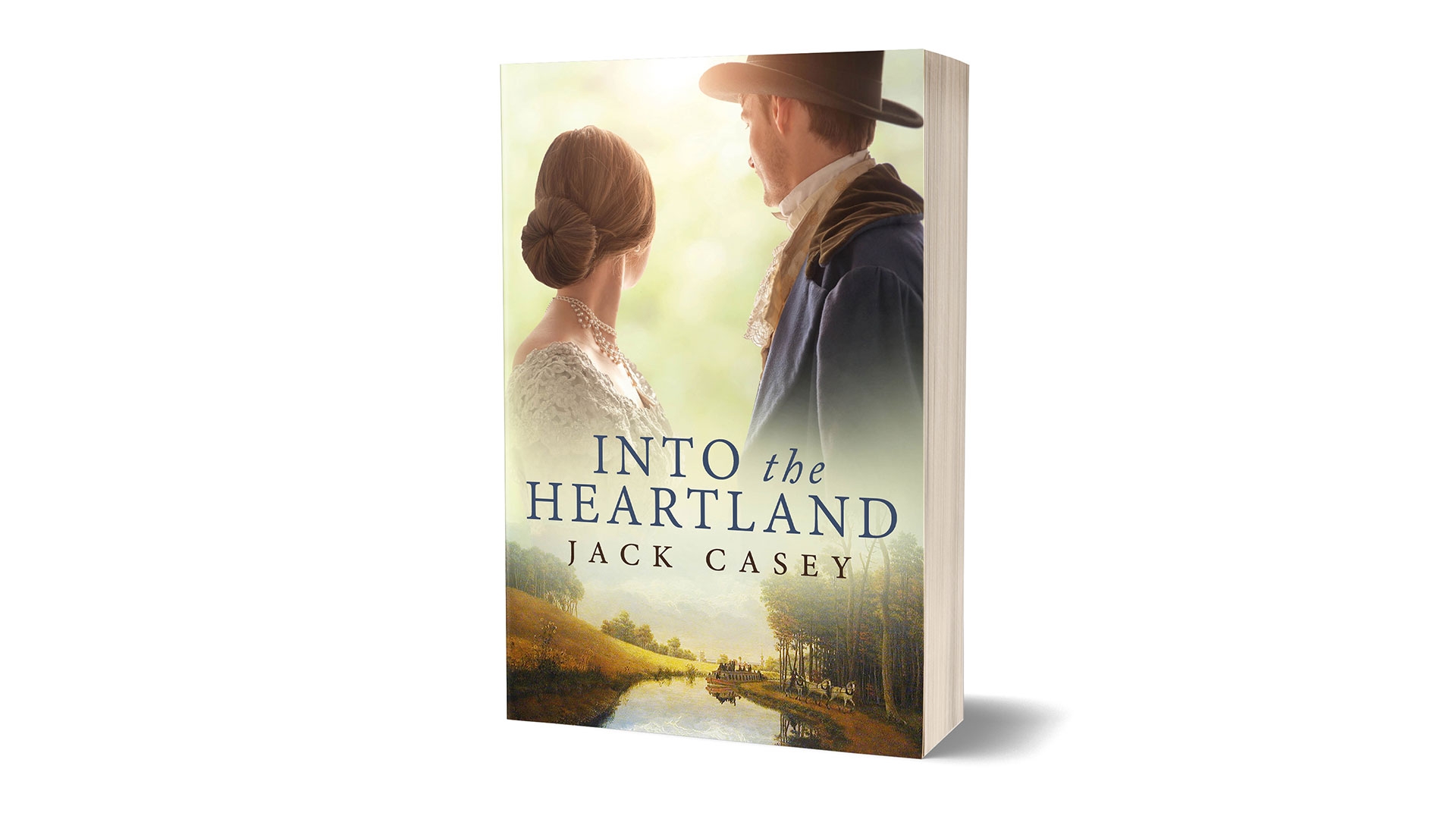Hamilton, Burr and Origins of the Duel

On the frontier, “fastest gun in the West” was a coveted title young men risked their lives to win. Wild Bill Hickok catapulted to fame by killing Davis Tutt who challenged him over a $20 gambling debt. This time-honored custom of a “showdown” to settle disputes descended from the European dueling ritual. How did dueling evolve?
In ancient times, disputes were often submitted to “trial by combat.” The parties to the dispute would meet with weapons and whichever combatant lived at the end of the fight showed God’s will in the matter, and justice was done. The term “duel” means “a war between two,” and was first used when combat between two representative warriors decided the victory or defeat of their entire armies. As the custom of dueling evolved (sword and cudgel fights before the advent of guns), a code duello was written to set forth the rules for the conduct of an “affair of honor.”
Duels were common in early America. Andrew Jackson, the seventh president, fought twenty duels. Commodore Steven Decatur, hero of the war against the Barbary pirates and the War of 1812, fell in a duel at the age of forty-one, at the height of his naval career. He’d been through many naval battles, and yet as he died, he cried out, “I did not know that any man could suffer such pain!” Dueling, also known as “an interview” or “an affair of honor,” was so common in the navy that combatants were threatened with immediate discharge for engaging in the custom.
Alexander Hamilton served with distinction in the Continental Army, and then as Secretary of the Treasury. He had many disputes, and he was involved in ten duels, assisting the principals as a second seven times, and as a combatant three times. Every time Hamilton was challenged, he always talked his way out of it. On two prior occasions he had come close to a duel with Aaron Burr, but both times he reached accommodation without gunfire.
In November, 1801 Hamilton’s eldest son Philip accosted a Burr supporter, attorney George Eacker, in a theater over a speech Eacker had made the previous Fourth of July. In that speech, Eacker had called Philip’s father a traitor and monarchist for his sympathy toward Great Britain. Philip was 19 years old at the time and his exchange at the theater that night resulted in Philip and his companion being challenged to duel by Eacker. General Hamilton’s involvement in his son’s “affair of honor” is unclear, but a contemporary account suggests he knew about it and allowed his son to go. Eacker mortally wounded Philip, and the nineteen-year-old died in agony in a bed between his father and his mother, who was then pregnant with her eighth child.
Hamilton’s newspaper The New York Evening Post, characterized Philip’s death as a murder. The loss of Hamilton’s firstborn and presumptive heir sent him into a tailspin of recrimination and depression. Before Philip’s duel, Hamilton likely was concerned that Philip would not be labeled either a coward or a murderer, either one presenting an impossible obstacle to Philip’s future political career. But of course Philip’s death eclipsed any concern for reputation. To make matters worse, the second Hamilton child, Angelica, suffered a psychotic break at her brother’s death, rendering her a functional child for the rest of her long life.
Dueling persisted, of course. Just months before the Hamilton-Burr duel, William Coleman, Hamilton’s editor at The Post, killed New York Harbormaster Jeremiah Thompson when Thompson accused him of cowardice. After Coleman shot him, the attending physician and Thompson’s second left the harbormaster bleeding on his sister’s doorstep, rang the bell and ran away. Thompson never identified Coleman as his killer.
When Thomas Jefferson dumped Aaron Burr from the national ticket in early 1804, Burr sought to rehabilitate his political reputation by running for New York State governor. The opposing party, the Federalists, promised to support Burr if he agreed to bring New York into their secret secession plot once he became governor. When Hamilton, the architect of Federalism, learned of the conspiracy to dismantle the union by a faction of his own Federalist party, he worked energetically against Burr, and Burr lost the race by a huge sixteen-point margin. Burr no doubt needed revenge. To “hook” Hamilton, he elevated a hearsay “opinion,” the content of which no one knows to this day, into “fighting words,” and challenged Hamilton to meet him in Weehawken, N.J.
Hamilton turned to the husband of Eliza’s sister, Angelica Church, to borrow his set of dueling pistols. John Barker Church, an Englishman, had been involved in many duels. Five years before, in 1799, Church accused Burr of bribery, and Burr demanded satisfaction. Burr brought the wrong size pistol balls to load in Church’s pistols so that their shots went wide, and Church’s shot only sheared off a button from Burr’s overcoat.
When Hamilton met Burr in Weehawken, NJ, the accounts and “forensic evidence” were not completely clear but by most indications he “threw away his shot.” A gross misconception still attends any discussion of the Hamilton-Burr duel that this action was somehow honorable. To the contrary, Rule 13 of code duello expressly prohibits a combatant from “throwing away” his shot:
“No dumb shooting or firing in the air is admissible in any case. The challenger ought not to have challenged without receiving offense; and the challenged ought, if he gave offense, to have made an apology before he came on the ground; therefore, children’s play must be dishonorable on one side or the other, and is accordingly prohibited.”
Both Hamilton and his son reputedly determined to “throw away” their shots in order to avoid injury to their opponents and possible murder prosecutions. But contrary to today’s conventional wisdom, far from enhancing their honor, this strategy actually diminished it. As the Code says, if this was their intent, they should have refused the challenge and apologized and not engaged in the “child’s play” of “throwing away their shots.”
Another paradox about the Hamilton-Burr duel is the absence of any “lie” or “offense.” Although Burr got wind that Hamilton had said something that may have been derogatory to his honor, the specific “lie” or “offense” was never articulated and so the challenge rested on an unspecified hearsay remark that may or may not have been uttered. In short, Hamilton’s life was lost based on vague gossip.
Despite the deficiencies in the origin of his duel, Hamilton crossed the Hudson to Weehawken to face Burr’s loaded pistol, and Burr shot him. The results had widespread consequences. Hamilton went to an early grave, his children were orphaned and his wife widowed. The nation was much the worse for losing an effective leader who might have brought the county back from the brink of Jefferson’s Embargo Act and the divisive issue of slavery.
And the single shot Burr aimed at his former friend and colleague ended Burr’s political career, sent him into exile and forever cast him as an American villain as evil as Benedict Arnold, John Wilkes Booth or Lee Harvey Oswald.


